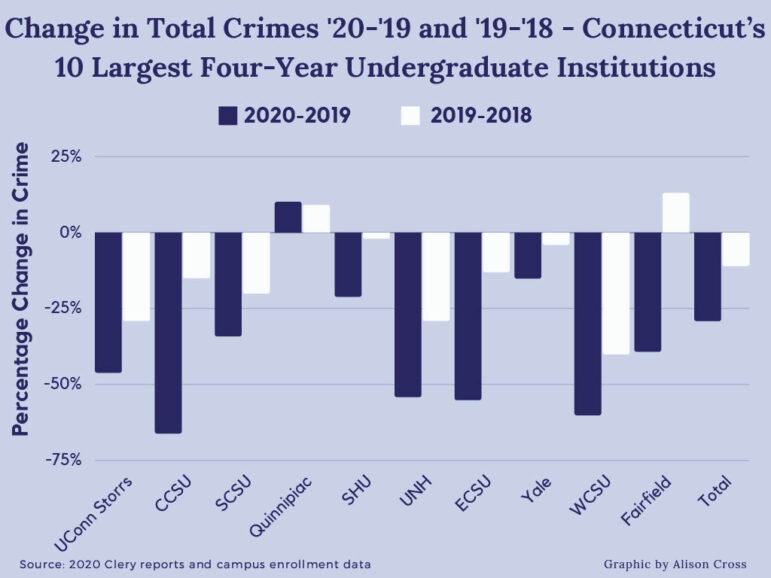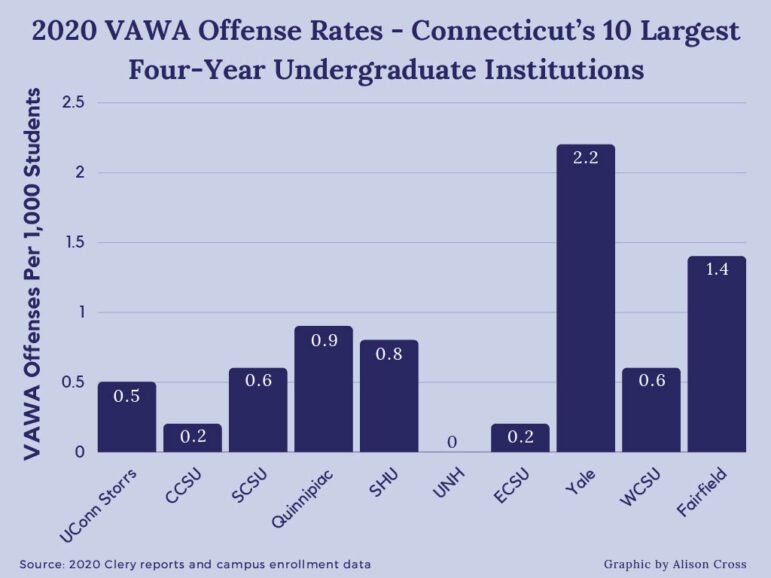New college safety data revealed a 29% decrease in all crimes reported across Connecticut’s 10 largest four-year undergraduate institutions from 2019 to 2020, including a 42% decrease in sexual offenses.
This 29% decline marks the steepest drop in recent years. Between 2018 and 2019, reported crimes among the 10 largest universities decreased by 11% and sexual offenses decreased by 17%. University of Connecticut spokesperson Stephanie Reitz said that the COVID-19 pandemic, which halted the spring semester and moved classes online in March of 2020, can explain that year’s dip in crime.
“The coronavirus pandemic significantly decreased the on-campus population at Storrs and the regional campuses for much of the 2020 calendar year, and the number of incidents reported during that period decreased as a result. Previous figures from 2019 and next year’s 2021 figures are expected to be more representative of a typical year,” Reitz wrote in a UConn press release.
 The 1990 Clery Act, named after a Lehigh University freshman who was raped and murdered in her dorm room by a fellow student in 1986, requires U.S. universities that accept federal financial aid funds to publish safety reports annually. Reportable Clery crimes include murder, negligent manslaughter, sex offenses (rape, fondling, incest and statutory rape), Violence Against Women Act offenses (dating violence, domestic violence and stalking), robbery, aggravated assault, burglary, motor vehicle theft, arson, hate crimes and liquor, drug and weapons law violations.
The 1990 Clery Act, named after a Lehigh University freshman who was raped and murdered in her dorm room by a fellow student in 1986, requires U.S. universities that accept federal financial aid funds to publish safety reports annually. Reportable Clery crimes include murder, negligent manslaughter, sex offenses (rape, fondling, incest and statutory rape), Violence Against Women Act offenses (dating violence, domestic violence and stalking), robbery, aggravated assault, burglary, motor vehicle theft, arson, hate crimes and liquor, drug and weapons law violations.
The reports, filed by UConn, Central Connecticut State University, Southern Connecticut State University, Quinnipiac University, Sacred Heart University, University of New Haven, Eastern Connecticut State University, Yale University, Western Connecticut State University and Fairfield University, document offenses on university grounds, university-recognized non-campus property and public areas that border campus. It does not include crimes that occur off-campus.
Of the 10 schools, the colleges with the lowest crime rates are CCSU (six crimes per 1,000 students), WCSU (six crimes per 1,000 students) and UNH (10 crimes per 1,000 students). The highest crime rates were recorded by Quinnipiac (66 per 1,000 students), SHU (55 per 1,000 students) and Fairfield (39 per 1,000 students).
Quinnipiac was the only school in the top 10 that saw an increase in overall crime. Between 2019 and 2020, Clery Act crimes reported at Quinnipiac rose from 590 to 647, a 10% increase. Approximately 96% of the offenses were drug/liquor law violations. Quinnipiac also recorded the highest rate of drug/liquor law violations, followed by SHU and Fairfield. These three schools documented rates of 63, 54 and 36 drug/liquor law violations per 1,000 students, respectively.
Among the 10 universities, only ECSU and SHU reported an increase in sexual offenses by one each, bringing the ECSU total to four sexual offenses and the SHU total to three.
 The three universities with the highest rate of reported sexual offenses were Yale (three per 1,000 students), WCSU (one per 1,000 students) and ECSU (one per 1,000 students). Yale also had the highest number of sexual offenses in 2020 with 33 total, followed by UConn Storrs with nine and WCSU with six. Every school reported at least two sexual offenses in 2020.
The three universities with the highest rate of reported sexual offenses were Yale (three per 1,000 students), WCSU (one per 1,000 students) and ECSU (one per 1,000 students). Yale also had the highest number of sexual offenses in 2020 with 33 total, followed by UConn Storrs with nine and WCSU with six. Every school reported at least two sexual offenses in 2020.
The schools with the lowest rates of sexual offenses were SCSU, University of New Haven, Sacred Heart, CCSU and UConn Storrs, all of which recorded a rate of less than 0.5 sexual offenses per 1,000 students.
Many survivors of sexual assault never report their experience to the police. According to the Rape, Abuse & Incest National Network, 20% of female students between the ages of 18 and 24 report their assault to law enforcement. RAINN estimates that during college, 13% of all undergraduates and graduate students experience rape or sexual assault. The rates are even higher for undergraduates.
“Among undergraduate students, 26.4% of females and 6.8% of males experience rape or sexual assault through physical force, violence, or incapacitation,” RAINN wrote on their website.
UNH was the only school to report no Violence Against Women Act offenses. Among all 10 universities, VAWA offense reports decreased by 40%. The schools that documented an increase in VAWA offenses during 2020 were Fairfield University (three additional for a total of eight), Quinnipiac (two additional for a total of nine) and Sacred Heart (one additional for a total of seven).
Yale, UConn Storrs and Quinnipiac documented the largest number of VAWA offenses with 27, 12 and nine offenses respectively. The schools with the highest rate of VAWA offenses in 2020 were Yale (two per 1,000 students), Fairfield (one per 1,000 students) and Quinnipiac (one per 1,000 students).
Half of the schools reported no hate crimes or bias-related incidents for 2020. Quinnipiac reported three, UConn Storrs and Yale both reported two, and UNH and WCSU reported one each.